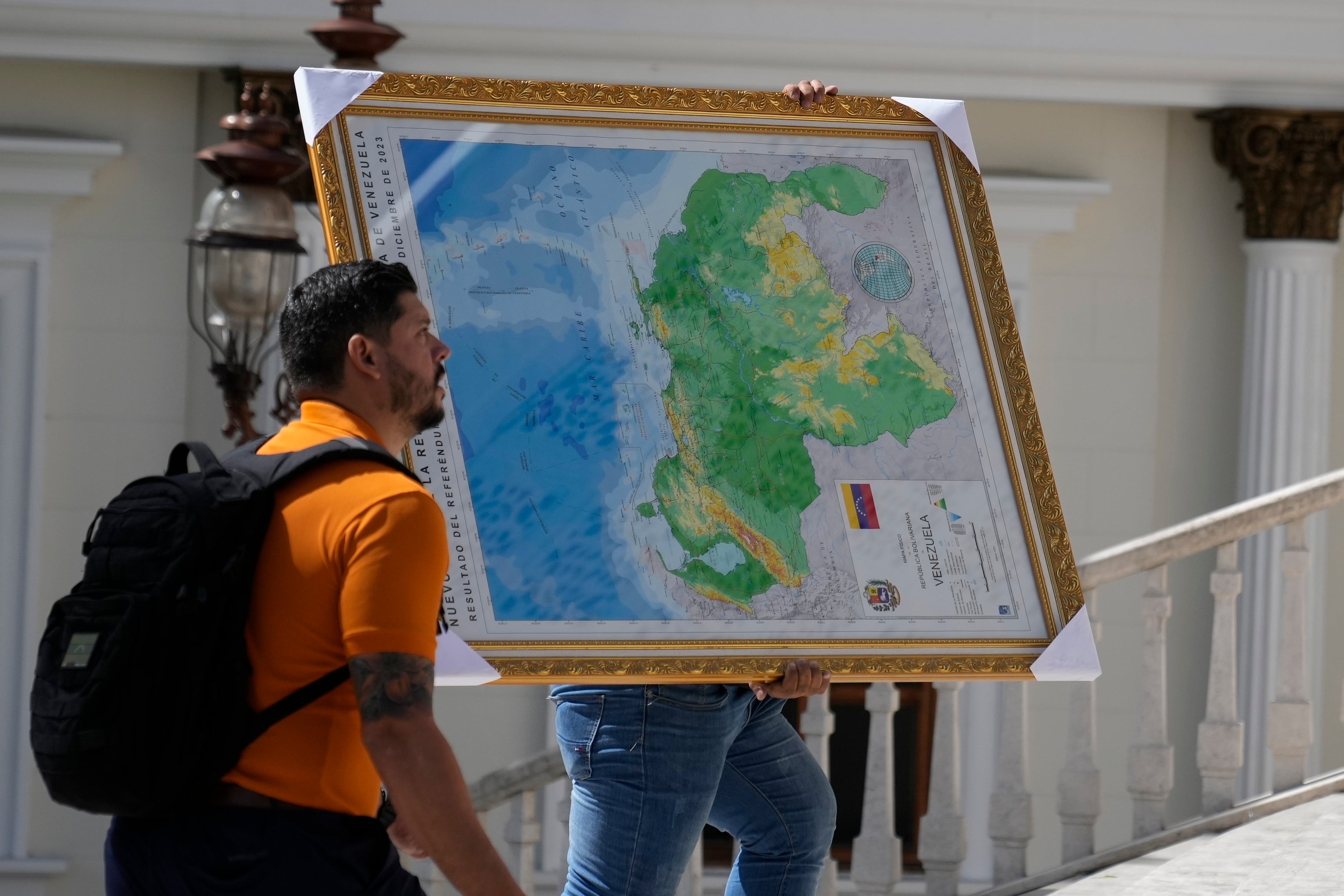Helicopter carrying 5 senior Guyana military officials is missing near tense border with Venezuela
A military helicopter carrying seven people has vanished near Guyana’s border with Venezuela

A military helicopter carrying seven people vanished Wednesday near Guyana’s border with Venezuela, with authorities saying there was bad weather in the area and stressing there was no indication it may have been hit by hostile fire as tensions escalate between the countries.
Two crew members aboard the helicopter were taking five senior officers on an inspection of troops guarding a border area that Venezuela claims as its own, according to Army Chief Brig. Gen. Omar Khan.
Venezuelan troops with heavy equipment and machinery have been amassing on the border in recent weeks, leading to speculation of an imminent invasion. Guyana’s President Irfaan Ali told The Associated Press earlier Wednesday that he was taking all necessary steps to defend his country.
Khan told reporters late Wednesday that Guyana’s Defense Force lost contact with the brand new Bell 412 EPI aircraft after it took off from Olive Creek settlement in western Guyana following a refueling stop.
Asked if the aircraft was shot out of the sky as it flew in a mountainous and heavily forested area, Khan said there are no indications that occurred.
“We do not have any information suggesting that there was any flight by Venezuelan aircraft in that area,” he said. “Speculation is not what I want to go into. Our priority is to save the lives of our officers and ranks.”
He said the U.S. government will help with the search when it resumes Thursday.
The aircraft’s disappearance about 30 miles (48 kilometers) east of the Venezuelan border comes as tensions heighten between Guyana and Venezuela over the Essequibo region, which is rich with minerals and located near massive oil deposits. Venezuela claims the region as its own, insisting it has been part of the country since Spanish rule.
Guyana has maintained that the border defined by international arbitrators in 1899 is the correct one.
On Sunday, Venezuelan President Nicolás Maduro held a referendum in which Venezuelans approved his claim of sovereignty over Essequibo. Then on Tuesday, Maduro said he would immediately grant operating licenses for exploration and exploitation in Essequibo and ordered the creation of local subsidiaries of Venezuelan public companies.
Guyana's president, when asked if he has requested military assistance in the dispute with Venezuela, said his government is reaching out to allies and regional partners, some of which Guyana has defense agreements with, to protect Essequibo. The region makes up two-thirds of the country.
“We take this threat very seriously, and we have initiated a number of precautionary measures to ensure the peace and stability of this region,” Ali said in the brief phone interview.
“Should Venezuela proceed to act in this reckless and adventurous manner, the region will have to respond,” he said. “And that is what we’re building. We’re building a regional response.”
Venezuela has the world’s largest proven oil reserves, but years of mismanagement and economic sanctions imposed by the U.S. against Maduro’s government have hurt PDVSA and subsidiaries.
Maduro announced the creation of a Comprehensive Defense Operational Zone for the territory in dispute. It would be similar to special military commands that operate in certain regions of Venezuela.
“The announcements by Venezuela are in full defiance of international law,” Ali said. “And any country that so openly defies important international bodies should be of concern not only for Guyana but for all of the world.”
Guyana expects to bring up the issue at Wednesday’s U.N. Security Council meeting.
The president said in a statement late Tuesday that his administration has reached out to the U.S., neighboring Brazil, the United Kingdom, France, the U.N. secretary general and the U.S. Southern Command, which oversees military operations in Central and South America and the Caribbean.
Venezuela’s government condemned Ali’s statement, accusing Guyana of acting irresponsibly and allegedly giving the U.S. Southern Command a green light to enter the Essequibo region.
Venezuela called on Guyana to resume dialogue and leave aside its “erratic, threatening and risky conduct.”
The diplomatic fight over the Essequibo region has flared over the years but intensified in 2015 after ExxonMobil announced it had found vast amounts of oil off its coast.
Bookmark popover
Removed from bookmarks